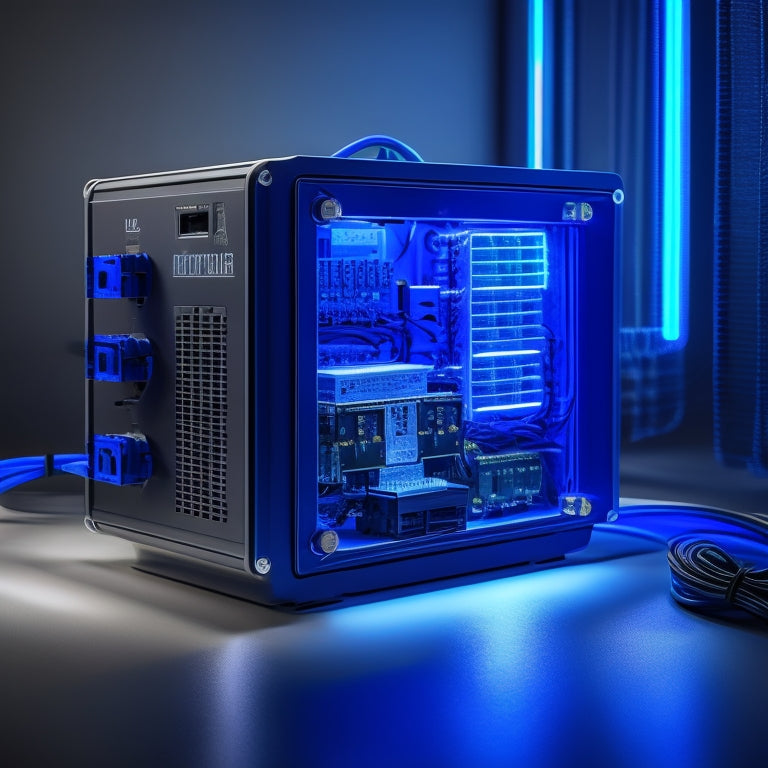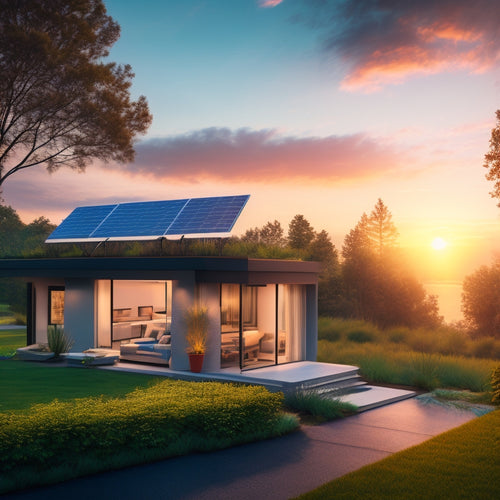
Combining Efficiency: Inverter-Charger Package Deals Explained
Share
You're looking to optimize your energy system with an inverter-charger package deal. These combos offer a streamlined installation process, reduced costs, and increased system reliability. By combining power conversion and charging capabilities, you'll experience seamless power management, reduced energy losses, and backup power during outages. When choosing a package, consider system compatibility, power priorities, and energy efficiency. With various types available, including high-capacity inverters and hybrid systems, you can maximize efficiency and savings. Now, discover how to optimize your system and minimize energy waste, and take the next step towards a more efficient energy setup.
Key Takeaways
• Inverter-charger package deals streamline installation, reducing overall cost and increasing system reliability while simplifying the system.
• These combos seamlessly convert power, manage AC and DC flows efficiently, and provide backup power during grid outages.
• Choosing the right package involves considering system compatibility, power priorities, energy efficiency, and off-grid system performance.
• Different package deal types cater to specific needs, including high-capacity inverters, marine applications, hybrid systems, and remote homes or villages.
• Maximizing efficiency and savings involves energy tracking, cost-optimized charging protocols, system optimization, and minimizing energy waste and bills.
Benefits of Inverter-Charger Packages
Moreover, when you invest in an inverter-charger package, you can expect a streamlined installation process, reduced overall cost, and increased system reliability, all of which contribute to a more efficient and cost-effective off-grid energy solution.
By combining these two essential components into one unit, you'll experience system simplification, reducing the complexity of your energy system. This, in turn, leads to a reduction in installation time and labor costs, resulting in significant cost reduction.
With a single, integrated unit, you'll have fewer components to install, wire, and maintain, minimizing the risk of component failure and reducing the need for additional hardware. This streamlined approach also enables easier system monitoring and troubleshooting, ensuring your energy system remains online and efficient.
Moreover, the reduced component count and simplified design lead to increased system reliability, reducing the likelihood of downtime and associated costs. Overall, inverter-charger packages offer a more efficient, cost-effective, and reliable solution for off-grid energy systems, making them an attractive option for those seeking innovative energy solutions.
How Inverter-Charger Combos Work
By combining an inverter and a charger in one unit, you create a seamless power conversion process that efficiently manages your off-grid energy system's AC and DC power flows. This integration enables you to harness power from various sources, such as solar panels or wind turbines, and convert it into usable AC power for your appliances.
The inverter-charger combo guarantees that your system's power conversion is optimized, reducing energy losses and increasing overall efficiency.
The charger component of the combo ensures that your batteries are fully charged and ready to provide backup power during grid outages or when your renewable energy sources aren't generating power.
The inverter component then converts the DC power stored in your batteries to AC power, which is fed into your electrical panel and distributed to your appliances. This system integration enables a smooth shift between grid power and off-grid power, providing you with a reliable and efficient energy system.
Choosing the Right Package Deal
With your inverter-charger combo up and running, it's time to contemplate the specifics of your package deal. Selecting the right one can make all the difference in optimizing your off-grid energy system's performance. You'll need to ponder several key factors to guarantee you're getting the most out of your system.
Here are three essential deliberations to keep in mind:
-
System Compatibility: Make sure that your inverter-charger package deal is compatible with your existing energy system components, including your solar panels, battery bank, and electrical load.
-
Power Priorities: Establish your power priorities, such as which appliances or systems need to be powered first in the event of an outage or when grid power is unavailable.
-
Energy Efficiency: Opt for a package deal that prioritizes energy efficiency, minimizing energy waste and reducing your system's overall carbon footprint.
Inverter-Charger Package Deal Types
You'll encounter several inverter-charger package deal types, each catering to specific off-grid energy system needs and configurations. These packages are designed to provide a seamless integration of power conversion and charging capabilities, ensuring reliable and efficient energy management.
For off-grid systems, you'll find packages that combine high-capacity inverters with advanced charging capabilities, ideal for remote homes, cabins, or villages. These systems prioritize reliability, durability, and flexibility to adapt to varying energy demands.
In marine applications, inverter-charger package deals are optimized for compactness, lightweight design, and high-performance power conversion. These packages are designed to withstand harsh marine environments while providing a stable and efficient power supply for onboard systems.
Other package deal types include hybrid systems that combine inverter-chargers with generators, solar controllers, or wind turbine interfaces. These hybrid solutions offer unparalleled flexibility and customization for unique off-grid energy requirements.
Maximizing Efficiency and Savings
Optimizing your inverter-charger package deal for maximum efficiency and savings requires careful consideration of several key factors. These include system sizing, component selection, and charging protocols. By getting these elements right, you can greatly reduce energy waste and minimize your energy bills.
To maximize efficiency and savings, focus on the following:
-
Energy tracking: Implement a monitoring system to track your energy usage and identify areas of inefficiency. This data will help you optimize your system and make data-driven decisions.
-
Cost optimization: Analyze your energy usage patterns and adjust your charging protocols to minimize peak-hour consumption, reducing your energy costs.
-
System optimization: Ensure your inverter-charger package is properly sized for your energy needs, and that your component selection is optimized for maximum efficiency.
Frequently Asked Questions
Can I Customize an Inverter-Charger Package for My Specific Needs?
You can customize an inverter-charger package to fit your specific needs, prioritizing power allocation through system integration, ensuring efficient energy distribution and peak performance tailored to your unique requirements, with power prioritization ensuring seamless operation.
Do Inverter-Charger Packages Work With Alternative Energy Sources?
You'll be pleased to know that inverter-charger packages seamlessly integrate with alternative energy sources, fostering Renewable Integration and Energy Synergy, allowing you to harness the power of solar, wind, or hydro energy with optimized efficiency.
Are Inverter-Charger Packages Suitable for Small-Scale Residential Use?
You might think inverter-charger packages are too bulky for small-scale residential use, but surprisingly, they're designed to optimize Home Energy in compact spaces, making them perfect for homes with Space Constraints, allowing you to harness renewable energy efficiently.
Can I Install an Inverter-Charger Package Myself or Do I Need a Pro?
If you're considering self-installation, be aware that inverter-charger packages require careful planning and electrical knowledge to guarantee safety; without proper expertise, you may risk electrical shock, fires, or system malfunctions, so it's recommended to hire a professional for a safe and efficient setup.
Are Inverter-Charger Packages Compatible With Existing Electrical Systems?
When integrating an inverter-charger package, you'll need to guarantee system integration with your existing electrical system, achieving electrical harmony through power compatibility, to avoid disruptions to your existing infrastructure.
Related Posts
-

Top Eco-Friendly Camping Equipment for a Sustainable Adventure
When you're camping with the planet in mind, opt for eco-friendly gear like tents made from recycled materials and bi...
-

The Future of Residential Energy Storage
The future of residential energy storage looks promising and cost-effective for you. With lithium-ion battery prices ...
-

Solar Powered Lights for Sustainable Home Decor
Solar-powered lights offer a stylish and eco-friendly way to enhance your home decor. They capture sunlight, converti...


